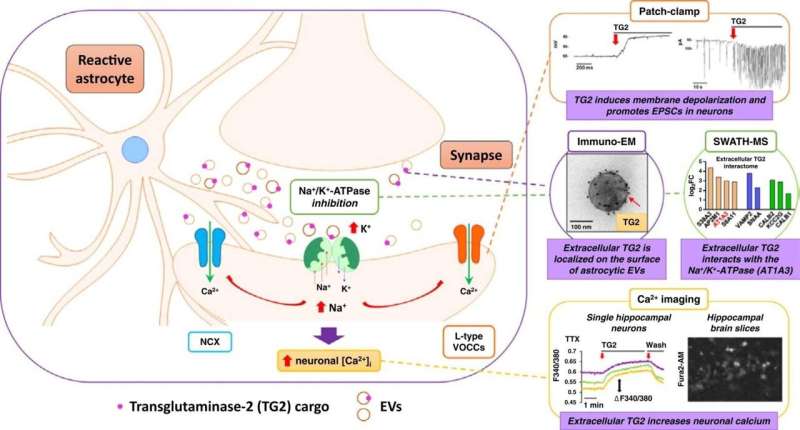Graphical abstract. Credit: Progress in Neurobiology (2022). DOI: 10.1016/j.pneurobio.2022.102313
Tiny "nano-shuttles" transport a damaging cargo around the brain where it goes on to play a role in the degeneration of cells, a study has suggested.
Scientists at Nottingham Trent University and the National Research Council Institute of Neuroscience in Milan have established how these micro vesicles ship the enzyme "transglutaminase 2" (TG2) from one cell type to another.
TG2 is abundant in many cells and, while it can have a protective role, has been associated with various human diseases, including neurodegenerative diseases such as dementia.
The researchers have now revealed a mechanism through which this might occur, reporting for the first time how TG2 is shuttled from astrocytes, the most numerous cell type in the central nervous system, to neurons in the brain. Their study suggests that the process may happen normally as the brain adapts to new information, but that it increases in disease as astrocytes—which are central to the brain's immune response—are stimulated.
The team found that TG2 is responsible for driving a small influx of calcium ion to neurons, a careful balance of which is known to be crucial to their survival and ability to communicate. Even tiny increases in calcium ion can create dysregulation of neurons, which can lead to neurodegeneration and dementia. The actual mechanism through which this calcium ion alteration occurs has also been proposed, with the researchers suggesting it is due to a shift in electric charge distribution, resulting in less negative charge inside the neuron compared to the outside.
During the study, carried out in animal cells, the team also found that the increase in calcium ion was reversible through TG2 removal. The team hopes that future work could look at the effect in patients with neurodegenerative conditions. It is hoped that better understanding of the biological process leading to the damage of cells in the brain could be used to help control the further spread of disease.
"We have shown for the first time that TG2 travels to neurons and contributes to changing the level of calcium in neurons, a process that has been linked with neurodegeneration," said lead scientist Dr. Elisabetta Verderio Edwards, an associate professor in Nottingham Trent University's School of Science and Technology. "The balance of calcium ion is a fundamental biological process in neurons and small changes can build up over time and create dysregulation in the cells."
"Astrocytes secrete these tiny extracellular vesicles which act as microscopic shuttles—about 100 nanometers in diameter—to transport their cargo of TG2 between the cells."
First author Elisa Tonoli, a research fellow at Nottingham Trent University, says that "previous studies have shown that astrocytes undergo early changes in Alzheimer's Disease, however the cross-talk between astrocytes-neurons via extracellular vesicles has been less understood."
"We have now identified a new pathway initiated by astrocytes, which as well as being part of an essential physiological function under inflammatory conditions could lead to degeneration of brain cells."
The research was published in Progress in Neurobiology, and Nottingham Trent University researchers previously reported how TG2 also played a key role in the onset of kidney disease.
More information: Elisa Tonoli et al, Extracellular transglutaminase-2, nude or associated with astrocytic extracellular vesicles, modulates neuronal calcium homeostasis, Progress in Neurobiology (2022). DOI: 10.1016/j.pneurobio.2022.102313
Provided by Nottingham Trent University























